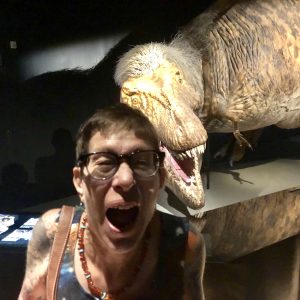Women of Wonder
- At August 02, 2019
- By Bob Howe
- In Blog Posts, News
 0
0
In July of this year, Eleanor Lang and I were on a river cruise in the Balkans (and that is another post altogether) when she was accosted by a fellow passenger—a man of a certain age—who noted she was reading Myla Goldberg’s Bee Season, and announced “I don’t read books by women. They don’t understand men.”

RAWR!
Eleanor Lang and T-Rex @ AMNH
This gentleman, let’s call him Bob, went on to enumerate his reading preferences, despite Ellie’s manifest and obvious disinterest. That the encounter did not end with Bob’s corpse being rolled off the stern of the boat in the dead of night I can only attribute to Ellie’s uncharacteristic restraint that evening (or the freely flowing Hungarian wine).
The grim joke here is that women often understand men far better than men understand women, because for women, that understanding is a survival skill. Later in the cruise, Bob had the poor judgment to share the same views with me. I told him he was wrong, and cited two or three women authors whose work he should read (he asked his wife to write them down). In the spirit of that list, here are a dozen works by women that have opened my eyes, in no particular order (the titles all link to the books’ pages at Powell’s Books, which include publishers’ notes).
Women of Wonder edited by Pamela Sargent (Anthology)
In the fall of 1980, fresh out of the Coast Guard, I took an English course, “Science Fiction as Literature,” taught by a Dr. Martinez. Foolishly, my heart sank a little when she told the class she was going to focus on women writers. It was possibly the best English class I took in my college career, and this book was its backbone.
Pilgrim at Tinker Creek by Annie Dillard (Nonfiction)
The Living by Annie Dillard (Novel)
There’s a reason Dillard is assigned in every first-year English class. Very much anchored in the natural world, her writing is lyrical and precise, and preoccupied with grisly deaths.
Lavinia by Ursula K. Le Guin (Novel)
All of Le Guin’s books are insightful, but I kept having to stop mid-sentence in this one to marvel at how keenly observed were the characters—women and men—within.
Close Range: Wyoming Stories by Annie Proulx (Collection)
The Shipping News by Annie Proulx (Novel)
Come for the oddball names of the characters; stay for crooked timber from which they’re built.
The God of Small Things by Arundhati Roy (Novel)
This won the Booker Prize in 1997—and for a good reason. They don’t just give those prizes away.
The Goldfinch by Donna Tartt (Novel)
This is a boy’s coming of age story. Tartt very much understands the hearts of boys, and those of the men they become.
Cowboys are My Weakness by Pam Houston (Collection)
This book holds up a sometimes uncomfortable mirror to modern American manhood. It is not John Ford’s Golden West.
We Are All Completely Beside Ourselves by Karen Joy Fowler (Novel)
A girl’s coming of age story. I had to stop reading it on my commute because no one wants to see a middle-aged man cry on the subway.
Code Name Verity by Elizabeth Wein (Novel)
A female spy captured by the Nazis in World War II. Though this is marketed as a Young Adult novel, I can tell you that it is as gritty and psychologically complex a book as any adult novel. “Kiss me, Hardy!”
A Not Entirely Benign Procedure: Four Years as a Medical Student by Perri Klass (Nonfiction)
Klass, who wrote the Vital Signs column for Discover magazine for several years, is a keen observer of medicine, and of her fellow physicians: she is as unsparing about herself as she is about them.
